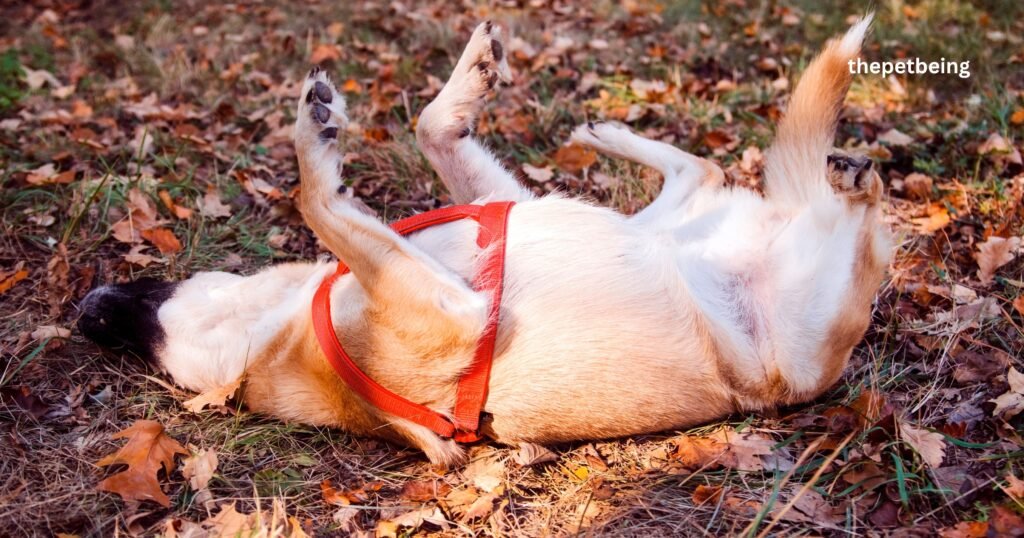Have you ever noticed Why Does My Dog Stick The Tip Of His Tongue Out When I Pet Him?
It might seem strange, but there’s usually a simple and sweet reason behind it.
Dogs communicate with us in their particular ways, and this is one of them.
Often, when a dog does this, it means they’re feeling comfortable and happy. It’s like a big, doggy smile.
So, when your dog gives you this adorable little tongue show while you’re giving them pets, it’s their way of saying, “I’m feeling good, and I like this.”
It’s a sign of trust and affection, a special doggy thank-you for being such a great friend.
Reasons Why Dogs Stick Their Tongue Out
Let’s delve into the reasons why dogs stick their tongues out.
While often linked to happiness and comfort, other factors contribute to this adorable gesture.
Understanding these can help us better comprehend our furry friends’ behavior.

1. Pleasure and Relaxation
Just as humans express their feelings, dogs, too, have their ways of showing contentment.
One such way is sticking their tongue out when petted.
This is an expected behavior seen in dogs when they are relaxed and enjoying the moment.
This can be compared to a human sighing in relief or enjoyment.
In other words, when dogs poke their tongue out while being petted, they are expressing their pleasure and satisfaction.
It’s a sign of comfort and happiness that your furry friend is sharing with you.
2. Concentration
Sometimes, dogs stick their tongues out when they are focused on something.
It’s like how some people stick out their tongues when they’re working on a tricky task.
Your dog might be concentrating hard on enjoying the feeling of being petted.
Just like how children stick their tongues out when they’re coloring, dogs might do the same when they’re in deep thought or focused on the good feelings they’re experiencing.
3. Cooling Down
Dogs have their unique ways of cooling down.
One common way is by sticking out their tongue.
This is because dogs can’t sweat like humans do.
Instead, they pant and let their tongue hang out to release heat. It’s like their particular type of air conditioner.
When you pet your dog, and he sticks his tongue out, it could be his way of cooling down and feeling more comfortable.

4. Feeling Tired
When your dog is tired, you might notice them sticking out their tongue.
It’s a cute doggy behavior that often happens when they’re getting sleepy.
They’re just so relaxed and comfortable that their little tongue slips out.
If you see this when you’re petting your dog, it’s a good bet they’re feeling cozy and ready for a nice nap.
5. Feeling Safe
Feeling safe is another reason why dogs may stick their tongue out.
When you pet your dog, they feel loved and secure.
This trust can make them relaxed to the point that their tongue peeks out.
It’s their way of showing they know they’re in safe hands.
So, when your dog’s tongue appears during petting, it’s a sign of trust and love between you two.
6. Health Issues
Sometimes, if a dog constantly has their tongue out, it could indicate a health problem.
This is known as “hanging tongue syndrome.” It can happen when a dog has a mouth or jaw injury or deformity.
If you notice any unusual changes in your dog’s tongue or behavior, it’s always a good idea to get them checked by a doctor to rule out any health issues.

Do You Need To Worry If Your Dog Sticks Their Tongue Out While You Pet Them
In most cases, you do not need to worry if your dog sticks their tongue out while you are petting them. It is usually a sign of being happy, relaxed, and comfortable with you.
It’s their adorable way of communicating their love and trust in you.
However, consistent tongue protrusion could be a sign of “hanging tongue syndrome,” a health issue seen in dogs with mouth or jaw injuries or deformities.
Therefore, while it is usually a harmless and endearing behavior, it’s essential to keep an eye on your furry friend.
If you notice your dog’s tongue hanging out all the time, or if your pet shows signs of discomfort, pain, or changes in eating or drinking habits, it’s a good idea to take them to the doctor. The doctor can check to make sure there isn’t a health problem causing this behavior. Paying attention to these small details can make a big difference in your dog’s overall health and happiness.
Conclusion
Why Does My Dog Stick The Tip Of His Tongue Out When I Pet Him? Your dog sticking its tongue out when you pet it is usually a sign of pure joy and relaxation. It’s their unique way of showing how much they’re enjoying your touch and affection. Sometimes, if they’re tired, they might let their tongue slip out as a sign of ultimate relaxation and comfort. Above all, it’s a sign of trust, showing that they feel safe and secure with you. However, if you notice their tongue hanging out constantly, or if there are signs of discomfort or changes in their behavior, it might indicate a health issue. In such cases, it’s best to consult a doctor.
Remember, understanding these adorable little signals from our furry friends can help us ensure their well-being and happiness. After all, they rely on us to decode their unique language of love and trust.
FAQs
Why do dogs stick their tongue out when being petted?
Dogs stick their tongue out while being petted because they feel happy and relaxed. It’s like their way of smiling. Sometimes, they do this when they’re focusing hard on something, just like people might stick their tongues out when they’re thinking. Dogs also pant and let their tongue out to cool down.
If your dog sticks their tongue out when tired, it’s because they feel very relaxed. It can also mean they trust you and feel safe. If your dog always has their tongue out, it might mean they have a health problem, and you should take them to the doctor.
Is it normal for my dog to have its tongue out all the time?
It’s not typical for dogs to have their tongue out constantly. This could be a sign of a health issue called “hanging tongue syndrome,” often seen in dogs with mouth or jaw problems.
If your dog has their tongue out all the time or shows signs of discomfort, you should take them to a vet for a check-up. Carefully observing your pet’s behavior helps ensure their well-being.
Can it be a sign of discomfort or stress?
Yes, if a dog constantly sticks their tongue out, it could indicate discomfort or stress, especially if they show other signs of distress like restlessness or changes in eating habits.
Constant tongue exposure might be due to a health issue called “hanging tongue syndrome.” Always check with a doctor if you notice any unusual behavior in your pet.
Should I be concerned if my dog sticks their tongue out while being petted?
No, there is generally no need to worry if your dog sticks their tongue out while being petted. It’s usually a sign they’re happy and relaxed. They might also do this to cool down or show they feel safe with you.
But, if their tongue is out all the time or they show signs of discomfort, it could indicate a health issue. In such cases, it’s best to take them to a doctor for a check-up. Always remember to keep your pet’s well-being in mind.
Can You Stop A Dog From Sticking Their Tongue Out While Being Petted?
No, you generally cannot stop a dog from sticking their tongue out while being petted. It’s a natural behavior showing they are happy and relaxed.
If it doesn’t bother them, it should not be discouraged. However, if their tongue is always out or they show signs of discomfort, it’s worth checking with a vet.
They will advise if the behavior is linked to a health issue and guide you on what to do next. It’s always important to understand your pet’s habits and ensure they are healthy and comfortable.
Does age play a role in this behavior?
Yes, age does play a role in this behavior. Puppies often stick their tongue out while teething. Older dogs might have their tongue out more often due to health issues or loose teeth.
Also, as dogs age, they may become more relaxed and comfortable with their owners. This could make them more likely to stick their tongue out while being petted. However, the behavior varies from dog to dog.
Always watch for any signs of discomfort or changes in behavior. Consult a vet if you have any concerns.

